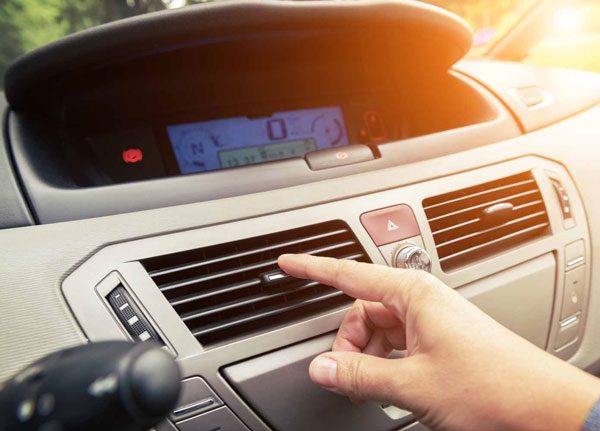Your car’s air conditioner does an excellent job of removing heat and moisture within the cabin. But sometimes, you might get a smell like chemicals out of comfort.
What does it imply when a car air conditioner smells like chemicals? A car AC that smells like chemicals could signify many things, like mold buildup on the AC surfaces. The chemical-like smell may also suggest the refrigerant is leaking or the cabin air filter needs to be changed. Also, the smell could be from the windshield washer fluid or other chemical products.
So, how do you eliminate the chemical odors from your car AC? In this post, you will learn how to stop the smells, the reasons behind them and tips to prevent this from recurring.
Chemical Smells In Car Air Conditioners: Causes and Solutions

Before we jump right into the main article, here is a table summarizing the causes of chemical smells in car AC.
| Causes | Solutions |
| 1. A Buildup of Mold and Bacteria | Change the cabin air filter |
| Use spray disinfectant to clean vent inlets and outlets | |
| 2. Leaky Refrigerant | Seal the leaky points |
| Replace the leaking components | |
| 3. Dirty Cabin Air Filter | Install new filter |
| Clean the drain pipe, vents, and evaporator | |
| 4. Windshield Washer Fluid | Clean the windshield with a garden hose to flush out the washer fluid and refill it again |
| Replace the carbon air filter with an activated carbon unit | |
| 5. New Car Smell | Get rid of any plastic coverings |
| Use absorbents and air fresheners | |
| Roll the windows down | |
| Install air purifiers | |
| 6. Open Containers of Chemical Products | Close the containers and move them away from the car |
Why Car Air Conditioner Smells Like Chemicals?

Even with the best car, you may experience chemical-like smells in your vehicle’s air conditioner. Let’s find out what causes these odors and follow the steps to fix them.
1. Mold and Bacteria Build Up
A car air conditioner is built to remove moisture from the air, keeping your car’s interior cool in hot weather. However, water usually condenses on the AC’s evaporator when you turn the engine off.
And if this water on the evaporator does not drain, mold and bacteria may grow on the AC’s surfaces. As a result, your car may smell horrible, like chemicals, vinegar, or ammonia, when you turn on the AC.

How To Fix?
Step 1. The first thing you must do is replace the cabin air filter.
Step 2. If the odor remains, spray every vent inlet and outlet on the dashboard with a spray disinfectant. This will help kill any bacteria present.
Step 3. But before spraying, roll all the windows down and open the doors. Step 4. Then, run the AC at the highest temperature and spray the disinfectant. This will ensure the spray reaches the evaporator.
2. Refrigerant Leak
Your vehicle’s AC runs on refrigerant, a chemical compound responsible for absorbing heat inside the cabin. This compound may leak due to the wear and tear of the evaporator coil. It may also leak around the O-ring seals or expansion valve over time.
However, you will likely notice the leak when the AC is off. Because of the leaking refrigerant, your car’s air conditioner may smell various sweet chemicals, including chloroform and ether. In some cases, your AC may smell like exhaust fumes.

How To Fix?
Step 1. You can patch the leak points in the evaporator coil, O-rings, condenser, gaskets, and connection hoses for minor or slow leaks. You simply use a sealer or Stop Leak product.
Step 2. But for severe leaks, you will have to replace the defective components. It could be the condenser, hose, or even the evaporator.
3. Dirty Cabin Air Filter
If you fail to change your cabin air filter, it may eventually clog up with dirt and debris. As a result, you may end up with foul odors inside your car, like nail polish, acetone, or chemicals.
Typically, the chemical smell may become more potent for the first few minutes after starting the engine and turning on the AC but eventually dissipates. However, some Audi car owners report the foul odor is more like vinegar.
How To Fix?
Step 1. The first thing to do is replace the cabin air filter. You can find the filter in the passenger-side footwell under the glove compartment. Here is a short video on how to replace the filter:
Step 2. In addition, you should have the vents, evaporator, and drain pipe cleaned to get rid of bacterial growth. This is because the bacteria may produce chemical smells.
4. Windshield Washer Fluid
Using windshield washer fluid may also result in an intense chemical smell in the cabin when AC is on. You see, when you wash your vehicle’s windshield, the fluid usually drains into the cabin ventilation intake.
Eventually, this fluid usually dries up, turning to vapor. This vapor may have a strong chemical smell that is neither moldy nor musty. The scent is more like glue or nail polish and comes from the air conditioner, not the fan.

How To Fix?
Step. 1. Get a garden hose pipe and wash down your car’s windshield. This should help flush out all the washer fluid in your cabin’s ventilation intake.
Step 2. Then, refill the windshield with a different washer fluid and flush it out using a garden hose.
Step 3. Lastly, top up the washers with more liquid.
Step 4. Alternatively, replace the cabin air filter with one featuring activated carbon. It will help absorb the washer fluid odor.
5. New Car Smell
A brand-new car may also emit chemical odors, known as the new car smell. This smell comprises a mix of chemical compounds from the materials used to manufacture the vehicle.
For example, there is benzene with a gasoline-like odor found in the rubber parts of the car. These compounds usually emit a strong smell that disperses into the car vents. The scent then spreads inside the car via the air conditioner.

How To Fix?
Step 1. Start by removing any plastic coverings inside your car.
Step 2. Secondly, try installing air purifiers that combine activated charcoal and HEPA filters in the car.
Step 3. Alternatively, you can use absorbents such as baking soda, vinegar, and activated charcoal.
Rolling down the windows or using an air freshener can also help eliminate the chemical odors.
6. Nearby Open Chemical Products
Sometimes, the chemical-like smell from your car’s air conditioner may not be a problem in your vehicle. The odor could come from chemical products in your garage, like paint supplies.
If you leave these products open and near your car, your vehicle’s AC may suck their strong chemical odor. This means you will only smell the chemicals when the AC is on.

How To Fix?
Check for any open containers containing chemical products in your car and close or move them away.
Tips To Prevent Chemical Smells From Recurring in The Car AC
Once you have eliminated chemical-like smells in your car’s AC, how do you prevent them from reoccurring? Here are tips to help you.
- Turn off the AC at least 10 minutes before arriving at your destination. This will allow the evaporator to dry and prevent mold and bacteria growth
- Have your car air conditioner regularly serviced at least once a year, including topping off the refrigerant
- Keep the air vents clean by vacuuming them regularly to eliminate dust and debris
- Change the cabin air filter between every 15,000 and 30,000 miles or when dirty
- Make it a habit to regularly use car air freshener, deodorant, or anti-bacterial spray. These products will help neutralize chemical odors in the air

FAQs
Here are some frequently asked queries regarding car AC smelling like chemicals. Check them out.
You may experience difficulty breathing, vomiting, eye irritation, headache, and nausea due to a refrigerant leak.
A paint-thinner smell could mean that your car AC is leaking fluids. In most cases, it is due to a refrigerant leak.
Yes, like changing the carbon air filter. But if you have to clean the vent inlets, outlets, evaporator, and drain pipe, you should let a professional do it.
Conclusion
Your car air conditioner smells like chemicals may occur for various reasons. But in most cases, the cause of this problem is usually mold and bacteria building up on the AC surfaces.
A leaky refrigerant, dirty air filter, and windshield washer fluid could also produce a chemical-like odor. However, nothing to worry about because each of these causes has a solution. Even better, several tips exist on how to prevent the smells from recurring.

